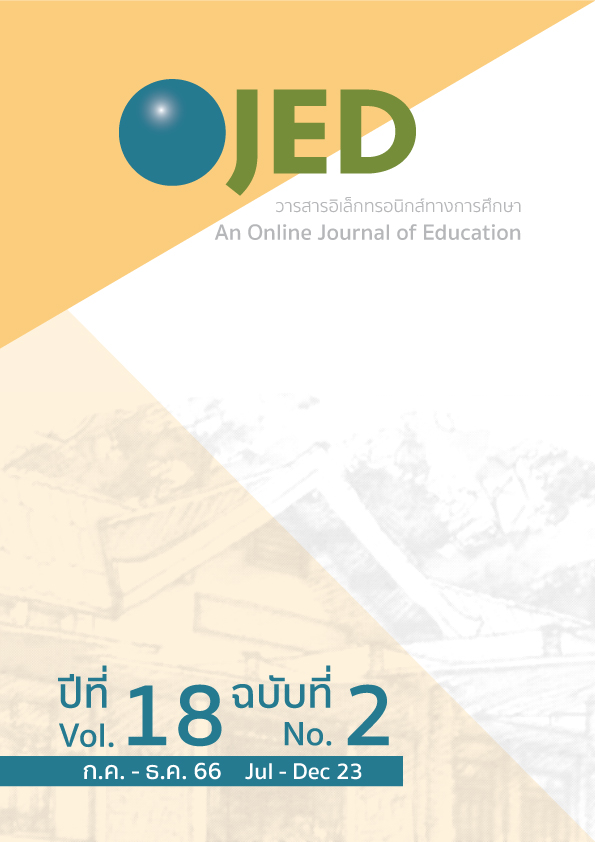Development of Climate Change Education Curriculum to Promote Climate Literacy of Lower Secondary School Students
DOI:
https://doi.org/10.14456/ojed.2023.23Keywords:
curriculum development, Climate change education, Climate literacyAbstract
The purpose of this research was to develop a climate change education curriculum for lower secondary school students. The participants in this research were: 1) six interviewees from the field of climate change or environmental education, and 2) three curriculum and course document evaluators. The research used a descriptive research methodology. The tools used for the research consisted of 1) an opinion interview form about the climate change education curriculum and 2) an assessment form on the suitability and consistency of the curriculum and course documents. The results showed: 1. A climate change education curriculum should: 1) focus on the dimensions of economy and social and global citizenship, including topics regarding adaptation, mitigation, and climate resilience, 2) utilize a teaching approach that incorporates a situation- and problem-based learning model, and 3) adapt to the context of students in each area to manage learning. 2. The curriculum developed by the researcher consisted of 4 learning units. The assessment of the curriculum showed mean scores at a strongly agreed level (M=2.7, SD=0.29); assessment scores of the course documents from Unit 1 showed mean scores at a moderately agreed level (M=2.47, SD=0.29), while those from Unit 2 showed mean scores at a moderately agreed level (M=2.37, SD=0.22), those from Unit 3 showed mean scores at a strongly agreed level (M=2.67, SD=0.21), and those from Unit 4 showed mean scores at a strongly agreed level (M=2.62, SD=0.34).
References
ภาษาไทย
กรมวิชาการ. (2539). การประเมินตามสภาพจริง. โรงพิมพ์คุรุสภา ลาดพร้าว.
กรมส่งเสริมคุณภาพสิ่งแวดล้อม. (2549). ถอดรหัสสิ่งแวดล้อมศึกษาในโรงเรียนจากการวิจัย http://elibrary.deqp.go.th/
กระทรวงศึกษาธิการ. (2557). แนวปฏิบัติการวัดและประเมินผลการเรียนรู้ ตามหลักสูตรแกนกลางการศึกษาขั้นพื้นฐาน พุทธศักราช 2551 (พิมพ์ครั้งที่ 4). โรงพิมพ์ชุมนุมสหกรณ์การเกษตรแห่งประเทศไทย จำกัด.
กระทรวงศึกษาธิการ. (2560). ตัวชี้วัดและสาระการเรียนรู้แกนกลาง กลุ่มสาระการเรียนรู้วิทยาศาสตร์ (ฉบับปรับปรุง พ.ศ. 2560) ตามหลักสูตรแกนกลางการศึกษาขั้นพื้นฐาน พุทธศักราช 2551 (พิมพ์ครั้งที่ 1). ชุมนุมสหกรณ์การเกษตรแห่งประเทศไทย.
คงศักดิ์ ธาตุทอง. (2541). สามมุมมองสิ่งแวดล้อมศึกษาในโรงเรียนมัธยมศึกษา. วารสารศึกษาศาสตร์ มข, 20(1), 14-18.
วิชัย วงษ์ใหญ่. (2545). พัฒนาหลักสูตรและการสอน. มหาวิทยาลัยศรีนครินทรวิโรฒประสานมิตร.
วิศระ เชียงหว่อง. (2561). การพัฒนาหลักสูตรรายวิชาเพิ่มเติม เรื่อง ป่าชายเลนคือชีวิต. http://ithesis-ir.su.ac.th/dspace/bitstream/123456789/2279/1/57262316.pdf
สมควร ไข่แก้ว, สุนีย์ เหมาะประสิทธิ์, ปรินทร์ ชัยวิสุทธางกูร, วนิดา ธนประโยชน์ศักดิ์, และ กมลวรรณ กันยาประสิทธิ์. (2558). การพัฒนาหลักสูตรสิ่งแวดล้อมศึกษาแบบบูรณาการที่เน้นแหล่งเรียนรู้นอกห้องเรียนในจังหวัดภูเก็ตเพื่อส่งเสริมการรู้สิ่งแวดล้อมของนักเรียนระดับชั้นมัธยมศึกษาตอนปลาย. วารสารศึกษาศาสตร์ มหาวิทยาลัยบูรพา, 25(1), 50-63.
สมบุญ ศิลป์รุ่งธรรม์. (2547). อนาคตภาพหลักสูตรสิ่งแวดล้อมศึกษาระดับการศึกษาขั้นพื้นฐานในทศวรรษหน้า (ช่วงระหว่างปี 2547-2557).
ภาษาอังกฤษ
Anderson, A. (2010). Combating climate change through quality education. Brookings Global Economy and Development Washington, DC.
Anderson, A. (2012). Climate change education for mitigation and adaptation. Journal of Education for Sustainable Development, 6(2), 191-206.
Armstrong, A. K., Krasny, M. E., & Schuldt, J. P. (2018). Communicating climate change: A guide for educators. Cornell University Press.
Azevedo, J., & Marques, M. (2017). Climate literacy: a systematic review and model integration. International Journal of Global Warming, 12(3-4), 414-430.
Ornstein, A. C., Hunkins, F. P., & Pearson. (2017). Curriculum: Foundations, Principles, and Issues, Global Edition. Pearson Higher Education & Professional Group. https://books.google.co.th/books?id=D8OfjwEACAAJ
Pachauri, R. K., Allen, M. R., Barros, V. R., Broome, J., Cramer, W., Christ, R., Church, J. A., Clarke, L., Dahe, Q., & Dasgupta, P. (2014). Climate change 2014: synthesis report. Contribution of Working Groups I, II and III to the fifth assessment report of the Intergovernmental Panel on Climate Change. Ipcc.
Parsons, J., & Beauchamp, L. (2012). From knowledge to action: Shaping the future of curriculum development in Alberta. Alberta Education.
Print, M. (1993). Curriculum Development and Design. Allen & Unwin. https://books.google.co.th/books?id=0AaeaqKoElEC
Saylor, J. G., & Alexander, W. M. (1974). Planning Curriculum for Schools. Holt, Rinehart and Winston. https://books.google.co.th/books?id=7H8bAAAAMAAJ
Selby, D., & Kagawa, F. (2013). Climate change in the classroom: UNESCO course for secondary teachers on climate change education for sustainable development. Knowledge Sharing Platform. Retrieved December, 10, 2021.
Tyler, R. W., & University of Chicago. (1950). Basic Principles of Curriculum and Instruction. University of Chicago Press. https://books.google.co.th/books?id=qn8kAQAAMAAJ
UN. Secretary-General. (2018). Progress towards the Sustainable Development Goals : report of the Secretary-General. 19 p.
UNESCO. (2020). Education for sustainable development: A roadmap. In: unesco Paris, France.
US Global Change Research Program. (2009). Climate literacy: the essential principles of climate science. US Global Change Research Program.
Downloads
Published
How to Cite
Issue
Section
License
Copyright (c) 2023 An Online Journal of Education

This work is licensed under a Creative Commons Attribution-NonCommercial-NoDerivatives 4.0 International License.




